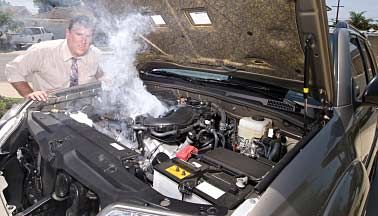Cooling system flush prevents overheating, engine damage
Question: My owner’s manual suggests getting cooling system flushes performed on my car, but it’s running fine. Do I really need this done?
 Answer: Your engine cooling system helps keep your engine from overheating, which is one of the most common causes of breakdowns and internal engine damage. A cooling system flush is basic maintenance that every car owner should be aware of.
Answer: Your engine cooling system helps keep your engine from overheating, which is one of the most common causes of breakdowns and internal engine damage. A cooling system flush is basic maintenance that every car owner should be aware of.
Every time you drive, your radiator uses coolant to help lower the temperatures in your vehicle’s engine.
Coolant, which is a 50-50 mix of water and antifreeze, flows through your car’s radiator, water pump and engine cooling passages to keep it operating at the proper temperature. Low coolant levels or coolant that’s dirty and contaminated from age and miles can lead to an overheating engine, which can lead to a literal meltdown.
Coolant that is still performing properly will be translucent and can be any variety of colors from green to red to orange. When its past its prime, it will become a brownish color and will be less translucent. If it’s in really bad shape, it can even be a sludgy brown. Not to mention, as it ages, it loses its ability to prevent corrosion inside the radiator, water pump and cooling passages. These components could literally rust from the inside out.
If left to deteriorate, it can take its toll on your cooling system. Common signs of cooling system problems include a low coolant warning light, the engine temperature gauge going to the red zone, low coolant levels, leaking coolant, steam under the hood and, in the winter, a heating system that blows cool air. An cooling system flush can prevent these problems from occurring.
How often you change the coolant depends on the type of vehicle you drive and the weather. In northern Illinois, which is known for steamy summers and harsh winters, you might need to change the coolant mixture at the beginning of summer and the start of winter.
Hong Kong Auto Service can help advise you of when the maintenance needs done. We’ll also thoroughly check the system’s other components, such as the drive belts, cooling fan, radiator, radiator hoses, water pump and even the radiator cap.
